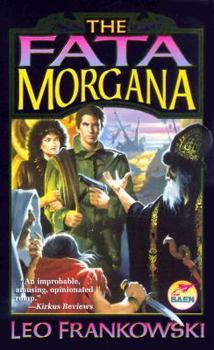The Fata Morgana
Select Format
Select Condition 
Book Overview
Two skeptical, modern engineers find their lives turned upside down when they accidentally stumble upon the legendary Western Isles, the mythical home of King Arthur's father, Uther Pendragon. This description may be from another edition of this product.
Format:Mass Market Paperback
Language:English
ISBN:0671578766
ISBN13:9780671578763
Release Date:July 2000
Publisher:Baen Books
Length:320 Pages
Weight:0.35 lbs.
Dimensions:0.9" x 4.3" x 6.8"
Related Subjects
Adventure Fantasy Fiction High Tech Literature & Fiction Science Fiction Science Fiction & FantasyCustomer Reviews
5 ratings
Don't take yourself so seriously
Published by Thriftbooks.com User , 23 years ago
It alarms me to see all of the people that write comparing Frankowski to Heinlein, or who try to over-analise (yes I meant that) his work.I find this book, like most of Frankowski's books, to be a pleasent diversion from being forced to think in ruts. It takes the kind of tounge in cheek humor that appears in spurts in the Conrad Stargard series and focuses more on it, as did A Boy and His Tank.It alarms me to see people reviewing it as if it were the Bible, when really it is a scapegoat, a diversion from having to think. Read a few chapters, then close your eyes and imagine "what if"...thats the key to Frankowski's books. I would have given it 4 and a half stars if I could have, just because the ending is somewhat dissastisfying (allthough nothing like A Boy and His Tank, I wanted to kick something when I finished that).In a way he is like a somewhat more technologically savy Douglas Adams. The explination of why the isles had never been discovered reminded me of Adams explanation of the race of beings that had never developed space travel, simply because it had never occured to them to look up. The unfounded accusations of bias and stereotype are pretty much nullified when you consider that Frankowski usually justifies almost everything his characters believe, at times to a fault. In my opinion this is probably due to his "method writing" style, and it helps to develop characters.All in all I would say that this book is an interesting diversion that allows you to ask "what if" without forcing you to think, if you don't want to. Don't try to make it something its not; Its not Heinlein, its not Tolkin, its not Verne (allthough I think Verne and Frankowski would feel a kinship), no matter how much you want to compare it to them, realise that its probably closer to "Hitchhiker's Guide to the Galaxy" than it is to anything else.
Overall Good Read
Published by Thriftbooks.com User , 24 years ago
Not up to par with the Conrad Stargard series, but it was interesting and presented several unique ideas on engineering and culture. The female characters were mostly one dimensional and were largely there as plot conveniences, but all in all it was not bad.
Another fun Frankowski story.
Published by Thriftbooks.com User , 24 years ago
As with nearly all of Frankowki's books, the main hero is an engineer, so there are some passages that are best appreciated by someone with a technical background. These are few and don't detract from an enjoyable story line. The plot turns are unexpected and keep the story interesting. Overall a good book.
Not his best, but still up there
Published by Thriftbooks.com User , 25 years ago
This was not Franowski's best novel, but he stills manages to make it an exhilarating read. the part I didn't like was that it didn't end very resolutely. It seems highly sequel-able and I hope Frankowski will do so.
Frankowski engineers another elegant Problem Solution
Published by Thriftbooks.com User , 25 years ago
Enjoyment of Leo Frankowski's books must come more easily to readers who are born to solve problems and bred to apply technology. An appreciation for the paradoxes involved in time travel often helps too. Want to know the dangers in over-engineering a ferrocrete yacht? Care to speculate on where and why Spam would be considered a gourmet food? Just want to get away from it all for a while so you can gain a fresh perspective on international trade and alternative political systems? Join Frankowski's daring duo of engineers on their round-the-world cruise. The story is told in the first person by one of the engineers, and his philosophical asides sometimes disrupt the flow of the plot; but I could not deny all five stars to any author who sends me looking for poems by Rudyard Kipling ["The Secret of the Machines"] -- even when he doesn't seem to know that the fiber component of hemp is the plant's vascular system and therefore not restricted to individual cells -- Super Hemp = No Problem. Good book, good problem solving, good way to spend a few summer hours.






